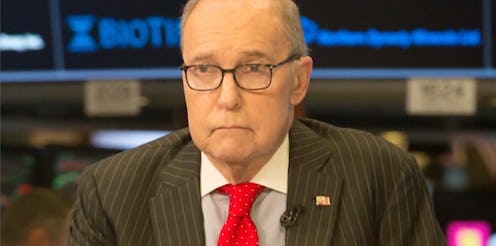After Donald Trump's previous top economic adviser, Gary Cohn, stepped down from his position, the White House confirmed Wednesday that it has chosen Cohn's replacement. Trump's new economic adviser, Larry Kudlow, has a net worth that is estimated to be $25 million, which is far less than Cohn's reported net worth.
Kudlow, a conservative economist, will now offer his insight to the president to shape the American economy. Although the exact salaries are not clear, Celebrity Net Worth points to Kudlow's career as an economic counsel in the private sector and a syndicated columnist as some of the main sources of his income.
Kudlow also has some political experience to tout. In the 1970s, he was working alongside high-ranking politicians like Bill Clinton while he was taken on by Joseph Duffey's U.S. Senate race.
As mentioned before, it doesn't seem like Kudlow and Cohn share the same financial ranking. According to New York Times, which analyzed Cohn's financial disclosure form, Cohn reportedly has assets that are worth to be between a whopping $252 million to $611 million. This would make him one of the richest politicians within Trump's administration.
Regardless of their varying net worths, their job descriptions will be identical. Just like Cohn, Kudlow's job will be to offer his advice on increasing job opportunities in energy, education, agriculture, tech, and other professional fields in the United States.
But his critics think that the job as the country's top economic adviser isn't suitable for Kudlow. Ian Salisbury wrote for TIME magazine and said that Kudlow has a long history of offering misguided economic "advice." He pointed to his career as the host of the Kudlow Report on CNBC to illustrate that Kudlow isn't fit for the role as economic adviser.
So, how did Kudlow get where is he today? According to COED, Kudlow grew up in New Jersey and later on attended private school as a youth. Kudlow's academic roots are actually not in economics but history. At the University of Rochester, he studied history and was a member of the Democratic Society at the institution, which may surprise some people considering the fact that Kudlow is a prominent conservative now working for a Republican government.
Later on, in the 1970s, Kudlow got admitted into Princeton and joined the Woodrow Wilson School of Public and International Affairs. This is where his familiarity with economics, at least on an academic level, began. He then joined the banking sector first as a staff member at the Federal Reserve Bank.
In the 1980s and 1990s, Kudlow dug deeper into politics by joining the Office of Management and Budget under former president Ronald Reagan. Later on, he joined the board of the conservative think-tank Empower America. With professional experience in advising politicians and private sector members on economics, Kudlow decided to give media a try. He published a book titled American Abundance: The New Economic and Moral Prosperity and began writing for the National Review Online.
Kudlow also became an anchor for CNBC's America Now, and his takes on the economy have been published in the Wall Street Journal and the Washington Times.
Trump picking Kudlow as his top economic adviser has been praised by conservatives. House Speaker Paul Ryan congratulated him on Twitter and said, "Larry Kudlow has been a friend and ally in the conservative movement for decades. I'm thrilled that @POTUS has named him the next Director of the National Economic Council."
Other observers, however, seem reluctant to celebrate this change. Some of them, like former Huffington Post reporter Jason Linkins, have pointed out how off the mark Kudlow was shortly before the recession in 2008. In November 2007, Kudlow infamously said, "There ain't no recession." Then the financial crisis hit, and chaos ensued not too long after that. It's safe to say that many people haven't forgotten Kudlow's comments.
